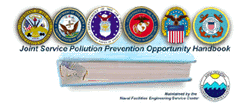| Overview: |
Printed circuit boards are a
common component of many electronic systems built for both military and
commercial applications. Printed circuit boards are typically manufactured
by laminating dry film on clean copper foil, which is supported on a
fiberglass plate matrix. The film is exposed with a film negative of the
circuit board design, and an etcher is used to remove unmasked copper foil
from the plate. Solder is then applied over the unetched copper on the
board. Depending upon the use and design of the particular printed circuit
board, various other metals may be used in the manufacturing process,
including lead, silver, gold, platinum, and mercury. Printed circuit
boards are potentially a difficult waste material to process, since they
generally have no usefulness once they are removed from the electrical
component in which they were installed, and they typically consist of
materials that classify them as a hazardous or "special" waste stream.
They must be segregated and handled separately from other non-hazardous
solid waste streams. Printed circuit boards that are handled as waste
materials must be processed using any one of several available disposal
options. Not only are these options expensive, they require a significant
amount of effort and handling by the generator. Furthermore, since some of
these disposal options do not include destruction of the waste circuit
boards, the generator also retains much of the liability associated with
improper handling or disposal.
As an alternative to off-site disposal, printed
circuit boards can be handled and processed to recover the value of the
raw materials that are used to produce the boards. There are several
companies that offer recycling services as an alternative to off-site
disposal of obsolete printed circuit boards. These services will generally
process the boards by systematically removing raw materials of value from
the board matrix. This includes metals such as silver, lead, copper, and
gold. Depending upon the volume and characteristics of the printed circuit
boards processed through a particular vendor, the raw materials can be
recovered and the salvage value potentially returned to the
generator.
Typically, the vendor will provide a waste material
profile form, which will be used by the generator to describe the nature,
quantity, and additional characteristics of the circuit boards to be
processed. Once the vendor approves of the processing arrangement, the
generator will prepare the circuit boards for shipment. The handling and
transportation methods used will depend on the volume of material,
distance to be shipped, and vendor requirements.
|
| Compliance Benefit: |
None noted
|
| Materials Compatibility: |
This should generally not be
a consideration, since virtually all of the components of printed circuit
boards are stable, solid materials when handled under normal circumstances.
There may be some concern associated with printed circuit boards that contain
unstable and/or toxic components such as mercury, certain forms of lead,
and some electronic components that are attached to the boards. The waste
recycling vendor should be contacted if there are any potential concerns
regarding material compatibility which may be encountered during shipment
or processing of the circuit boards.
|
| Safety and Health: |
There are minimal safety and
health concerns regarding circuit board recycling. For specific precautions
consult your local health and safety personnel.
|
| Benefits: |
- Recycling printed circuit boards has various
benefits including:
- Recovered value of raw materials, particularly
precious metals,reclaimed from processing the circuit boards.
- Savings resulting from the elimination of a
potential hazardous waste for "special" waste stream.
- Reduction of potential generator liability
associated with improper waste handling and/or disposal procedures.
- Generators can increase public awareness by
publicizing efforts made to bolster recycling initiatives at their
facilities.
|
| Disadvantages: |
- Market value of the reclaimed metals can fluctuate
abruptly.
- Boards containing inherently toxic or hazardous
materials such as mercury may have little or no recyclable value.
|
| Economic Analysis: |
The economics of printed circuit
board recycling will be determined by many factors, including the characteristics
of the boards to be recycled, market value of the reclaimed components/raw
materials, volume of boards being recycled, and conditions of the hazardous
waste/solid waste market. Boards containing valuable metals, such as gold
or silver, which can be readily reclaimed will be the easiest and most economically
beneficial to recycle. Boards which contain inherently toxic or hazardous
materials (e.g., mercury) may have little or no recyclable value and be
precluded from consideration in a recycling program.
|
| Approving Authority: |
Approval is controlled locally
and should be implemented only after engineering approval has been granted.
Major claimant approval is not required.
|
